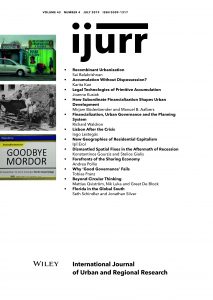This article studies the development of Warsaw’s Służewiec neighbourhood, Poland’s largest business district, as a case of real estate financialization. We argue that the neighbourhood’s chaotic ‘de‐contextualized’ growth was shaped by Poland’s semi‐peripheral position in the global economy on the one hand—enabling a process of subordinate financialization—and legacies of state socialism on the other. In so doing, we mobilize research on peripheral financialization and global economic hierarchies, and studies of post‐socialism to enhance debates about real estate financialization. Commercial real estate—and office development in particular—is a crucial domain in which contemporary core–periphery structures are produced and negotiated. A key function of subordinate financialization is to absorb globally mobile capital—the product of financialization in the core. The case of Służewiec shows that only by considering the interplay of global hierarchies (Poland’s position as capital absorbent), local dynamics (fragmented urban development, which was characterized by competition among these unequal municipalities, with local growth coalitions in some municipalities, but not in others) and specific historical legacies (Warsaw’s socialist‐time functional organization and its transformation, which weakened the city) can we fully understand the specific dynamics that shape real estate financialization in different places.
Details
Written by:
Mirjam Büdenbender & Manuel B. Aalbers
Digital Object Identifier (DOI)
10.1111/1468-2427.12791
About DOI

